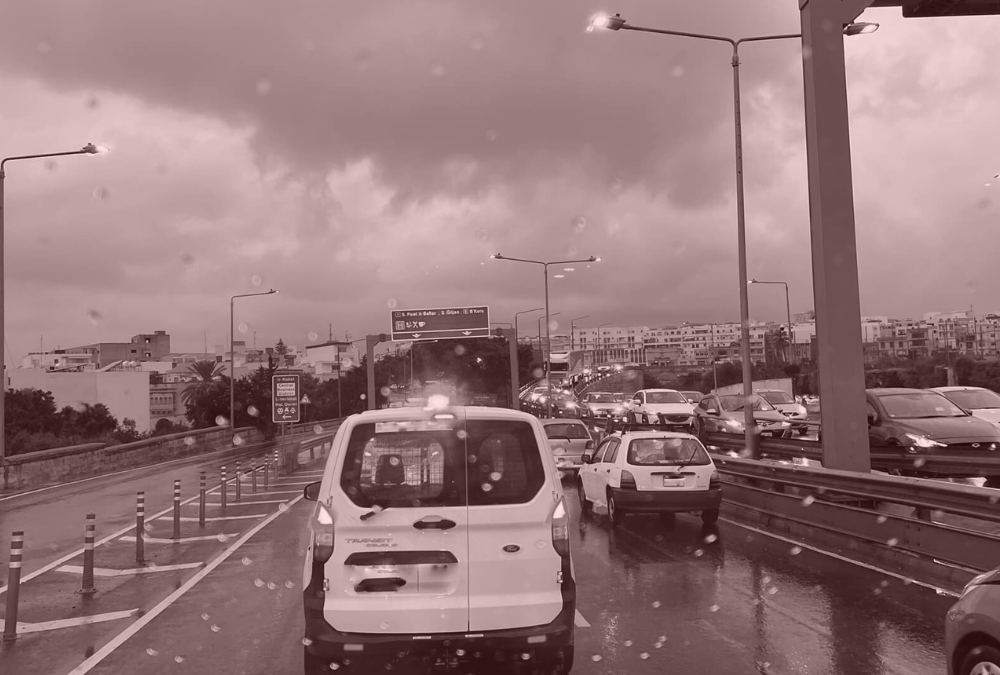As a journalist, one of the things I must do to be effective in my line of work is gauge public sentiment and understand what is on people’s minds at any given moment. It is not simply a cold, commercial calculation along the lines of ‘if I write about what people are talking about, then more people will read my work’. It is also because the best moment to get a message across is when most people’s attention is, for some reason or another, forcefully directed towards a specific issue. More on that later.
In the case of a gloomy, rainy weekday morning where several of Malta’s arterial roads seem to be closed for resurfacing, it is obviously going to be traffic.
The Times of Malta’s Giulia Magri captured the mood spectacularly this morning. In an article titled ‘Traffic problems delay parliament sitting for the second time in a month’, the first sentence she wrote was:
“MPs got a taste of how commuters feel every day after parliament was delayed on Wednesday for the second time in a month due to traffic problems.”
Brilliant. Just by reading the first sentence, you immediately understand that the author of the piece gets it. MPs, who form part of a political class that is largely sheltered and/or detached from the pressing matters which the general public wants them to address, fouled up their responsibility to the nation so badly that even they are feeling the direct results of their shortcomings, sheltered as they may be.
Although I hasten to add that the above is my own inference and that I am drawing my own conclusion based on how the sentence is framed, to me, that sentence is the perfect example of what gauging public sentiment is all about.
Earlier this month, I gave a speech at Daphne’s monthly vigil. When I was reading up about surveys gauging voter sentiment in order to flesh out the point I made when addressing the crowd, one of the stand-out issues was, besides foreigners in Malta and the cost of living, traffic management. In terms of priority, it was head and shoulders above the public’s concerns about corruption, judging from the percentages that the survey gathered.
I feel like one of the mistakes we make as members of civil society (and even as journalists) is to sometimes become so jaded that we despair at how people can foam at the mouth with rage at the thought of foreigners seeking to live their lives in our backyard and traffic jams but then barely bat an eyelid when journalists expose yet another massive corruption scandal.
Situations like this morning – when everyone is hyper-fixating over an issue like traffic because it is such an immediately obvious problem that is directly impacting everyday life – are an opportunity, not an occasion for despair.
It is an opportunity to remind everyone that these threads are all sown from the fabric of corruption. Abysmal traffic management doesn’t happen because we can’t collectively figure out transportation. It happens because there are road contractors who are always hungry for direct orders and ministers who are all too happy to dish them out. It happens because the key entities which are responsible for roadworks and planning are stuffed full of people who are incompetent at their jobs but were very competent at canvassing for one minister or the other.
I wrote ‘corruption is a slow, patient killer’ because in the end, what makes a government collapse under the weight of its own iniquity won’t be the great, complex swindles involving offshore companies, more dodgy lawyers and accountants than you can count on four hands, and lying politicians who spent a whole career honing their straight face while driving a knife in your rib cage.
That kind of collapse happens when corruption becomes so manifest that everyday necessities become difficult or downright impossible to attain – in other words, when people can’t get to work, when people can’t afford to eat as much as they could, when people can’t breathe because the trees that they grew up under were butchered at the orders of men who understand nothing but know the price of everything.
We learn best when we need to, and there is no greater need than fixing problems which visibly affect your life on a daily basis. Within that context, it is the duty of those who labour to inform public discussion to remind everyone about who is responsible for these problems, what action, if any, has been taken to address them, and what consequences (or lack thereof) have been faced by those who abdicated their duty.


